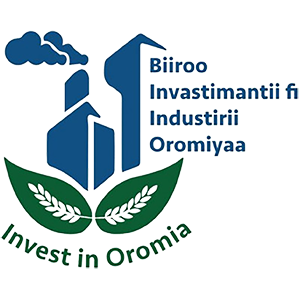The Oromia Investment and Industry Bureau (OIIB) is mandated to lead, coordinate, and regulate investment and industrial development in the Oromia National Regional State. Its main powers and functions include the following:
- Formulates investment policies and strategies that enhance investment expansion in the region, presents them to the regional government for approval, and implements them upon endorsement.
- Collects and manages investment-related data and regional resource information; prepares and disseminates the regional investment map and ensures its implementation.
- Identifies investment opportunities and potential sectors and provides relevant information to prospective investors.
- Prepares and distributes promotional materials and organizes special events to attract investors and stakeholders.
- Reviews land-use plans to identify suitable project types for investment and submits recommendations to relevant authorities for approval and implementation.
- Coordinates with the Bureau of Land to manage investment land data, ensures the fulfillment of basic infrastructure, and publicizes approved sites.
- Issues, renews, and revokes investment licenses; takes corrective actions against unlawful investment activities in accordance with applicable laws.
- Signs, registers, and monitors large-scale investment project agreements approved by the Regional investment Board or its delegate; implementation procedures are determined by regulation.
- Facilitates and registers land lease agreements between investors and regional, zonal, city, or district administrations; monitors their implementation.
- Approves investment projects that have passed environmental and social impact assessments conducted by the relevant authority.
- Monitors and coordinates the utilization and allocation of investment land in accordance with investment laws and agreements; works with stakeholders to resolve investor challenges.
- Registers project construction designs and monitors their implementation in collaboration with relevant authorities.
- Follows up and supports investors to implement projects as per license and agreements within the specified period, and takes corrective action against non-performing projects.
- Prepares investment project evaluation criteria, screens project proposals, and submits those with high economic and social benefit to the Regional Council of Ministers or its delegate for approval.
- Ensures that local communities benefit from employment opportunities created by investment projects.
- Coordinates with the Bureau of Land and other relevant bodies on requests for project type changes in both urban and rural areas.
- Assesses the additional economic and social benefits of ongoing investment projects and takes corrective measures as needed.
- Implements incentives and recognition schemes for investors operating in urban and rural areas in accordance with the law.
- Develops and enforces supportive frameworks to encourage youth, women, farmers, pastoralists, cooperatives, and micro and small enterprises to participate in investment activities; monitors implementation.
- Provides one-stop investment services within industrial parks established by the Oromia Regional Government and supports the attraction of investors to these parks.
- Facilitates the transition of public development projects into private ownership and issues investment licenses as per existing procedures.
- Encourages investors to fulfill their corporate social responsibility (CSR) commitments.
- Supports community participation in industrial development; monitors and regulates industries operating within the region.
- Prepares and implements industrial support packages and monitors their effectiveness.
- Designs and implements capacity-building packages for institutions supporting industrial development.
- Identifies and promotes best practices and experiences in industrial development and fosters linkages among similar industries.
- Conducts research and creates favorable conditions for accelerated industrial development.
- Gives special support to strategic industries; collects, organizes, and disseminates industrial statistics.
- Provides technical assistance for the preparation of manufacturing project proposals.
- Identifies stakeholder roles in the regional manufacturing sector and ensures coordinated planning and implementation.
- Verifies that industries entering industrial zones comply with policy and legal frameworks, and signs agreements with investors; monitors their compliance.
- Ensures that industrial parks, clusters, and sheds developed by public or private entities comply with industrial development laws and policies; monitors and manages their operations.
- Works with relevant bodies to enhance productivity and skills in the manufacturing sector and facilitates access to training centers.
- Collaborates with environmental protection authorities to ensure industries meet environmental standards and promotes the establishment of green buffer zones in industrial areas.
- Promotes balanced industrial development across the region based on resource potential and equitable growth principles.
- Promotes regional industrial investment opportunities through workshops, symposiums, bazaars, and exhibitions in collaboration with stakeholders.
- Provides special support to export-oriented industries and facilitates international market access in cooperation with relevant institutions.
- Encourages investors in agriculture, trade, service, and construction sectors to diversify into manufacturing industries and provides necessary support.
- Enforces laws governing industrial trade competence certification and issues industrial trade licenses.
- Works with quality and standards institutions to help industries obtain product quality certification and ensure compliance with production standards.
